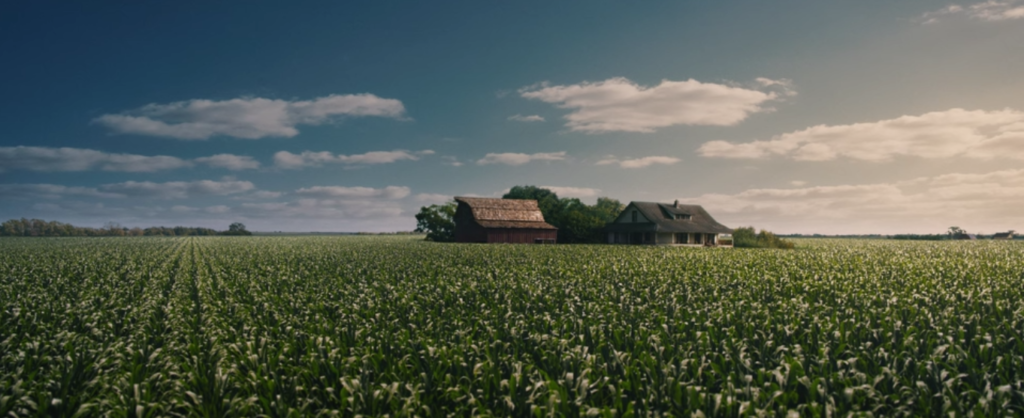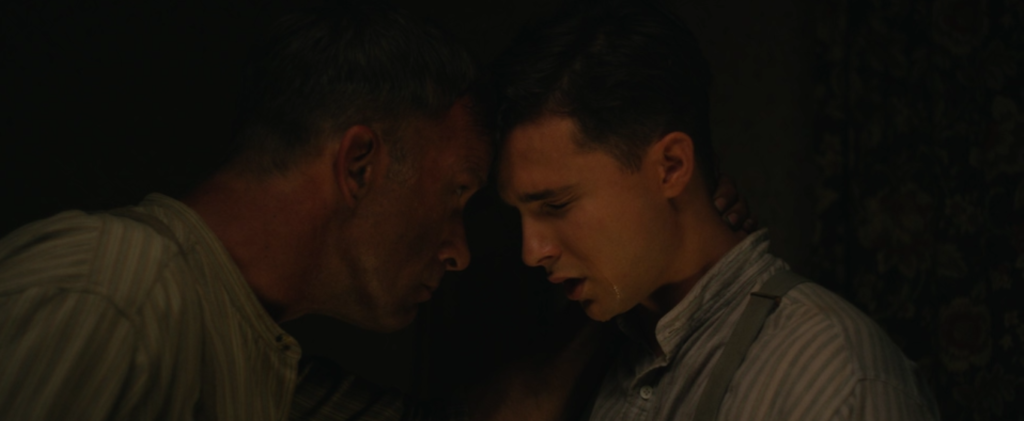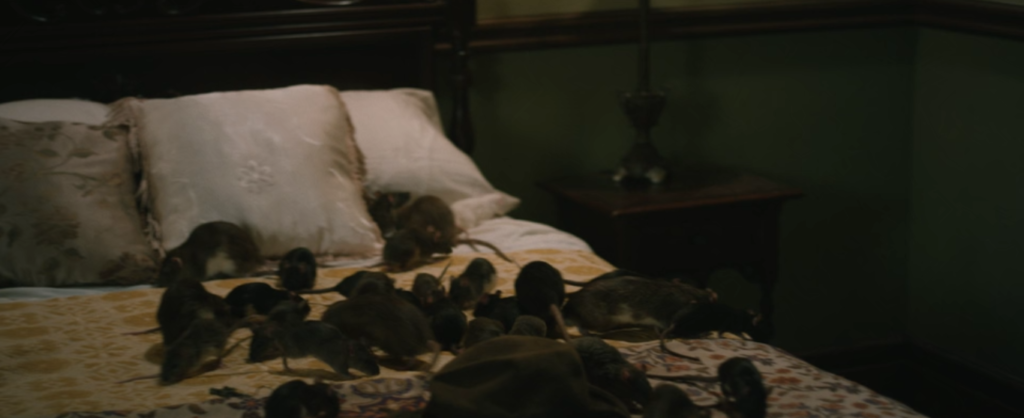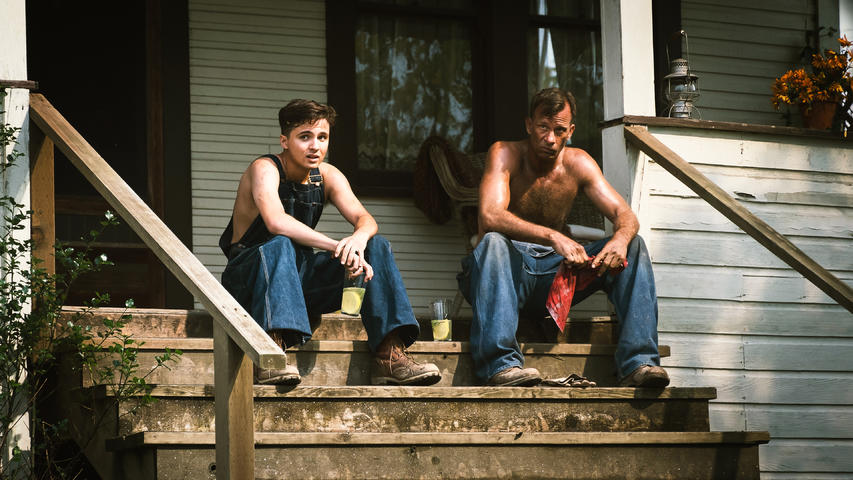Films based on Stephen King movies are like gemstones. Some of them, like The Shawshank Redemption or The Shining, are diamonds; flawless jewels that stand the test of time and are eternally beautiful. Some of them, like Christine or Secret Window, are flawed gems but nonetheless contain value. And then there’s fare like Maximum Overdrive, which aren’t gems at all – instead, just circular hunks of blue plastic shoddily attached to a child’s costume necklace, masquerading as something of worth. Look, what I’m getting at with this overblown metaphor is that not all King films are equal, and unfortunately 1922 is that middle option, a flawed gem, a film that is middling at best.
1922 was adapted and directed by Zak Hilditch and released straight to Netflix in 2017. Hilditch is also responsible for 2019’s Rattlesnake, which was also a straight-to-Netflix film. Netflix originals are about as hit-and-miss as King adaptations. 1922 isn’t one of the worst, but that isn’t saying much when you compare it to such fare as The Cloverfield Paradox, Secret Obsession and basically anything Adam Sandler produces for the streaming service.
The film is based on the story of the same name published in King’s 2010 collection Full Dark, No Stars. I’ve read the original story and quite enjoyed it. Whilst the novella doesn’t hit the heights of The Shining (the work I believe to be his magnum opus and one of my favourite novels of all time), it’s an entertaining and at times tense journey through the eyes of someone slowly going mad with guilt.
The film is, thankfully, a very close adaptation of the story. Our protagonist is Wilfred James (Thomas Jane), a farmer from a fictional town in Nebraska. According to Wilfred, “in 1922 a man’s pride was man’s land, and so was his son.” It’s unfortunate then that Wilfred’s wife Arlette (Molly Parker) does not share his love of farm life – or even love Wilfred himself. It is quickly revealed that Arlette wants to divorce Wilfred and sell the farm. She then wants to split the money earned by the farm’s sale and move to the city with their son Henry (Dylan Schmid). Wilfred however does not accept this an an option, so he decides that the only logical course of action is to murder his wife. What’s worse is that he is able to coerce Henry into being his accomplice. Wilfred proclaims at the outset of the film that “I believe that there’s another man inside every man. A stranger. A conniving man.” I think he means a psychopathic man.

If it seems like I’m giving a lot away in that synopsis, trust me, I’m not. What I’ve described barely covers the first twenty minutes of what amounts to a pretty wild ride of a film. The film’s main focus is what comes after the murder. Wilfred admits that the murder is something that he regrets, and the film shows you the reasons why he has come to feel that way.
To me, a woman, the film shows the lengths of what a man will do to avoid being emasculated. Wilfred would literally rather kill his wife than give up control of his land and his son to her and therefore, his pride, and what he feels is most important as a man. It’s a startling theme, but one that resonated in 2017 when the film was released and obviously still does in 2020. Ironically, though, by committing that ultimate sin and murdering Arlette, Wilfred does slowly begin to lose everything that is important to him. The film shows us that the old adage still rings true – pride really does goeth a fall. It also shows us the dangers of old-fashioned thinking about what makes a man “a man.”
Thomas Jane does a good job as Wilfred James. He is never sympathetic, but then he’s not supposed to be. Jane ensures that Wilfred really appears like someone who would not only be able to murder someone, but convince a teenager to help him. He imbues each scene he is in with a menacing intensity, and his Southern drawl is pitch-perfect (at least to an Australian).

Unfortunately, Jane is the best actor in the feature. Molly Parker, who plays Arlette, gives a performance that is average at best. However, part of this may be due to the fact that she’s saddled with a lot of lines that have been lifted verbatim from the source material. One of the worst offenders is when she is talking to her son about sex with Shannon Cotterie (Kaitlyn Bernard), the girl he is interested in. Arlette tells him to “make sure when [he’s] laying down with [Shannon] in the corn, or behind the barn, that [he’s] a no poke. Explore all you like and, you know, rub it with your Johnny Mac until he feels good and spits up, but just stay out of the home place.” Uhh… ok then. This is a line that, admittedly, read pretty badly in the original story, but is even worse when an actual person has to say it.
Dylan Schmid, who plays Henry James, the son of Wilfred and Arlette, is also merely passable. I haven’t actually got a lot more than that to say about his performance. That probably says enough anyway. The film does give him some interesting things to do, like eventually end up on the run, but he is not a particularly interesting or well-developed character. Henry is more a symbol of what Wilfred has to lose. That part isn’t Schmid’s fault, it’s just the way the story is, but Schmid doesn’t do enough work to make us sympathetic with a character that, unlike Wilfred, we are actually supposed to feel for.
Finally we have to address the big-ticket item for a horror flick: is it scary? Well, sometimes. There are some tense bits but overall this is not a film that is by any means genuinely scary. The film definitely could have done a better job of creating tension. There are the usual horror staples – creaky doors and floorboards, disembodied music and unwanted guests rising from the dead, but nothing we haven’t seen before in a hundred other more successful horror films. Wilfred eventually slips into madness, as so many King protagonists are wont to do, but unfortunately it’s not the compelling, horrifying kind of madness, a la Jack Torrance in The Shining. Instead there’s just rats. Lots and lots of rats.

I found myself getting a bit bored halfway through the film, but that may have been because I have read the story before and knew what was going to happen. Still, I’ve watched countless other book-to-film adaptations and still been excited or had a feeling of suspense about what was going to happen. A good film will still keep you engaged, even if its a familiar story.
Should you watch it? Well, I think it’s always interesting to see how directors bring stories that you’ve read to life (it’s helpful if its a story that you’ve read that you’ve actually liked, however).
So, watch it if you’ve read 1922, or if you’re a big Stephen King fan. It’s definitely not the best King adaptation out there, but it’s also not based on one of the best King properties, either. To come full-circle with that metaphor I began with, 1922 isn’t a bright, shining diamond, but it’s also worth something more than a necklace you’d find in a dollar-shop. Take from that what you will.
BEST BITS
– Thomas Jane’s mesmerizing Southern accent.
– The farm itself is gorgeous. Not gorgeous enough to murder someone over, but a place I’d definitely be sad to leave.
– Jane’s narration is taken pretty much directly from the original story and it fits in really well with the film.
WORST BITS
– The dialogue taken straight from the story. Here’s another example. Arlette spills her drink on her dress at one point in the film, and she says to Wilfred “you can suck it out of the cloth later.” Has uh… has anyone ever actually done that before?
– Henry and Shannon end up doing something pretty interesting at the end of the film, but barely any time is spent on it. It would have been interesting to see a bit more of their story.
FINAL RATING: 5/10.
